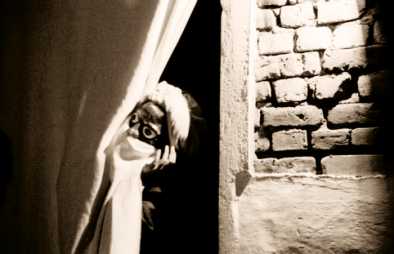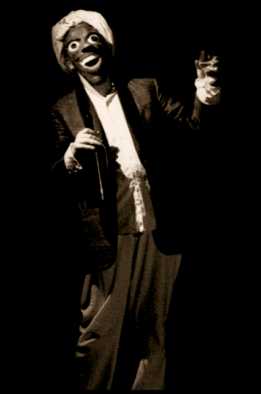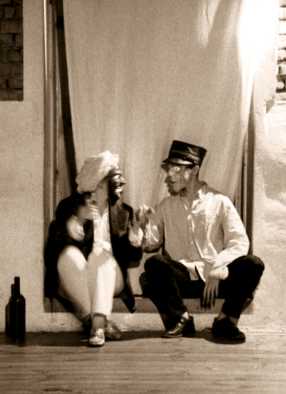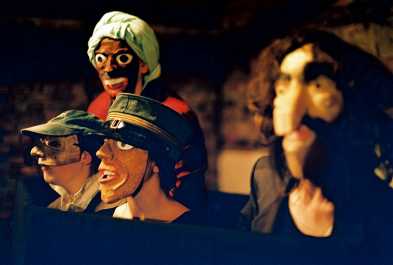11-042 jonkowo
węgajty 18
phone/fax: (0048-89) 5129297
art director: wacław sobaszek
 e-mail: wioskateatralna@gmail.com
how to get there
guest book
blog
links
e-mail: wioskateatralna@gmail.com
how to get there
guest book
blog
links
 e-mail: wioskateatralna@gmail.com
how to get there
guest book
blog
links
e-mail: wioskateatralna@gmail.com
how to get there
guest book
blog
links
synczyzna
(sonland)
-
"Nie obrzydłaż tobie polskość twoja? Nie dość tobie Męki? Nie dość odwiecznego Umęczenia, Udręczenia? A toż dzisiaj znowuż wam skórę łoją!
Tak to przy skórze swojej się upierasz? Nie chcesz czym Innym, czym Nowym stać się? Chceszże aby wszyscy Chłopcy wasi tylko za Ojcami
wszystko w kółko powtarzali? Oj, wypuścić Chłopaków z ojcowskiej klatki, a niech i po bezdrożach polatają, niechże i do Nieznanego
zajrzą! Owóż to Ojciec stary dotąd na źrebaku swoim oklep jechał, a nim powodował wedle myśli swojej... a niechże tera źrebak na kieł weźmie,
niech Ojca swego poniesie gdzie oczy poniesą! I już Ojcu mało oko nie zbieleje bo go Syn własny ponosi, ponosi! Hajda, hajda, wypuście wy
Chłopaków swoich, niech Lecą, niech Pędzą, niech Ponoszą!" Tak mówił w Trans-Atlantyku Gonzalo, na co Gombrowicz odpowiedział: "Milcz,
zaprzestań namowy swojej, bo niepodobna rzecz abym ja przeciw Ojcu i Ojczyźnie, a jeszcze w takiej jak obecna chwili!" Gonzalo zaś: "Do
diabła z Ojcem i Ojczyzną! Syn, syn, to mi dopiero, to rozumiem! A po co tobie Ojczyzna? Nie lepsza Synczyzna? Synczyzną ty Ojczyznę zastąp,
a zobaczysz!"
direction:
Wacław Sobaszek
performers:
Monika Blige, Daniel Brzeziński, Sławomir Gostański, Nelya Maria Lubyantseva, Erdmute Sobaszek, Wacław Sobaszek, Justyna Wielgus

 Maria Lubyantseva
Maria Lubyantseva
-
(...) "Sonland" ("Synczyzna") - what does it mean? It is the ironic
opposite of "Fatherland"; the hypothetical domain of sons, youth and
... immaturity.
For the acknowledgement of "Sonland" instead of "Fatherland" Gombrowicz was calling while on immigration in Argetina, when he was no longer able to put up with the ridiculousness of our national swank and pathetic poses. With his mockery he wanted to prick that absurd balloon. Did he believe this could be changed? This is another question.
The Węgajty artists from the very first scenes manage to transport the spectator into the very middle of things: in the black and vague dream of the main character of the "Wedding", Henryk. In the time of war, he is dreaming a dream about the deserted Poland and about his family house changed into a derelict den. The full of suggestion, vague and obscure dream delusion emerges in this theatre out of shadows cast by a candle flame. The proportions of things are distorted. (...) And a grotesque argument is going on: what does it actually mean: to be a father; is it some sanctified dignity, or a rank "like any other", which can be cancelled... the argument about "the role of the father" is at the same time a symbolic dispute about tradition and its degradation, about the order of nature and the order set by man, about morality, history and so many other things. Finally "father" means also fatherland: can you escape it at all? How far does the fatherland's shadow reach?
And the finale of this dispute, differing from the play's text, alludes at the writer's real fortune: through the windows into a musty inn, a draught of war blows, breaking the turbid, cloudy phantoms. And so - after the break - we come to in Argentina.
The passionate tango "Besa me mucho", the lively carnival of gaudy masks in the infamous harbour quarter of Buenos Aires - one would like to cry out: "We're alive!"
What a crazy contrast to the whispering shadows, to the heavy dream which we had just cast off! The masks are gorgeous. Fabulous comic theatre! The grotesque, "sarmatian" types of the Polish embassy jacks-in-office, with their gobs stuffed with patriotism, and their archaic honour code. Stinginess or extravagance: receive your guest grandly if you were to starve the next day... The comical portrait of Gonzalo, who sows outrage, as a 'puto', chasing young boys (Sonland being abundant in young sons!), but on the other hand - a millionaire and a figure it pays to stick to... so, what shall we do, sir, darling?... (...)
Tadeusz Szyłłejko, Shadows and Masks,
"Gazeta Olsztyńska" 7.09.2004
 Maria Lubyantseva, Daniel Brzeziński
Maria Lubyantseva, Daniel Brzeziński
 Maria Lubyantseva, Justyna Wielgus, Daniel Brzeziński, Wacław Sobaszek
Maria Lubyantseva, Justyna Wielgus, Daniel Brzeziński, Wacław Sobaszek

up
design: © Grzegorz Kumorowicz 




